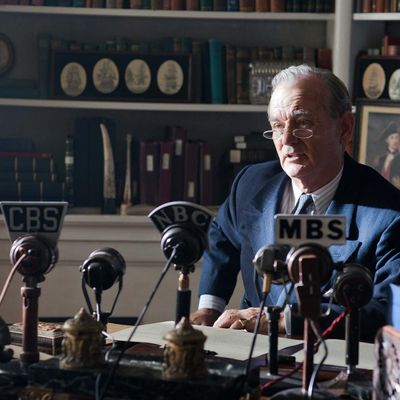
Obviously, a lot more than awards consideration goes into a film, but itÔÇÖs hard to avoid the faint whiff of awards-bait with Hyde Park on Hudson. For starters, itÔÇÖs got the long-denied-an-Oscar Bill Murray playing both the leader of the free world, and a disabled one at that. And if you squint really hard, you could even imagine it as a sequel of sorts to The KingÔÇÖs Speech, since much of it takes place during a visit to America by King George VI, last seen trying to overcome his stutter in Tom HooperÔÇÖs 2010 Tradition of Quality Oscar juggernaut. But donÔÇÖt expect any historical melodrama from Roger MichellÔÇÖs film, or any big ÔÇ£Oscar moments.ÔÇØ This is a cool, collected, concise film ÔÇö to its detriment.
Told from the point of view of Daisy (Laura Linney), a distant cousin who gets a call out of the blue to join President Franklin Delano Roosevelt (Murray) at his rustic getaway one day (his mom thinks she might take his mind off things), Hyde Park at times plays like the flipside to Steven SpielbergÔÇÖs Lincoln: There, private lives took a backseat to the vicissitudes of political horse-trading and the breathless drive of history. Here, everything is private. The president and those around him seem to exist in an ahistorical air pocket ÔÇö thereÔÇÖs just an early reference to the Depression, a brief nod to FDRÔÇÖs status as a master public communicator, and relatively little discussion of the looming war in Europe (though itÔÇÖs acknowledged as the reason why the King is visiting in the first place). ThatÔÇÖs all kind of the point, of course: Hyde Park on Hudson, the place, is described as where FDR goes to take a break from the worries of being one of the most-tasked presidents of all time.
You wouldnÔÇÖt guess it from seeing him, though. Murray plays FDR as a man always on, head arched back and cigarette holder pointed to the skies. ItÔÇÖs a public act, to be sure, but for this man public is private. Speeding away with Daisy in his specially designed car, he cheerfully leads her into a lush flower field and ÔÇö without breaking his optimistic, devil-may-care fa├ºade ÔÇö gently makes her give him a handjob. Soon enough, our heroine is in thrall to the president. That doesnÔÇÖt seem to bother First Lady Eleanor (a terrific and toothy Olivia Williams) much; she casually acknowledges FDRÔÇÖs fondness for doting young females (interesting, since Linney is actually four years older than Williams). There even seems to be a kind of gentle acceptance of Daisy on the part of FDRÔÇÖs secretary Missy (Elizabeth Marvel), with whom heÔÇÖs also having an affair.
Despite all these women, this is a lonely, twilight world FDR seems to inhabit. Or maybe it just feels lonely, because we rarely get close to any of the characters. Even Daisy seems devoid of personality: Linney, whose classical beauty suits the part, does what she can, but she hasnÔÇÖt been given much to do except be captivated by the leader of the free world. Somewhat strangely, the film doesnÔÇÖt really give FDR much to do either. We take it for granted that this is a man of power; presumably thatÔÇÖs what all these women are attracted to. Perhaps the film, running at a brisk 94 minutes, doesnÔÇÖt want to feel redundant and assumes that knowledge on our part. But itÔÇÖs still an odd choice: Even Lincoln kicked off with a scene showing the power Abraham Lincoln held over the average man. Somewhere in the filmic space, it helps to have something that makes us give a damn. But IÔÇÖm not sure the movie itself does: Michell and screenwriter Richard Nelson seem more interested in showing us the household getting ready for the KingÔÇÖs visit than in populating their handsome setting with people we can believe.
Ironically enough, the King (Samuel West), still stuttering, deeply insecure, and vaguely pathetic, fares better. When he confesses to Roosevelt that ÔÇ£Sometimes I think [my people] deserve better than me,ÔÇØ we can sense genuine desperation in his voice. ThereÔÇÖs a potentially rich irony here: The man heÔÇÖs talking to, after all, is one of the most beloved public figures of all time, a genuine myth in the American consciousness. But like so much else in this wisp of a film, the opportunity is soon lost. If Hyde Park on Hudson canÔÇÖt be bothered to care for its characters, why should we?


